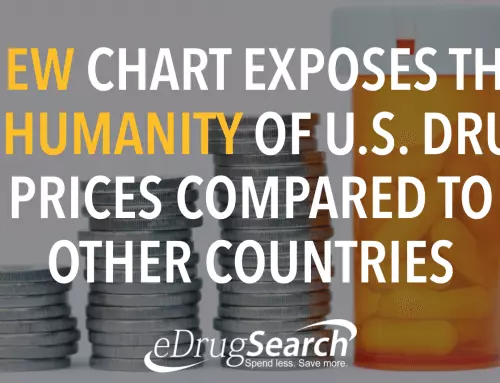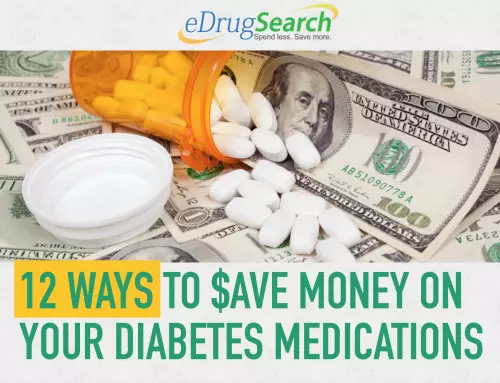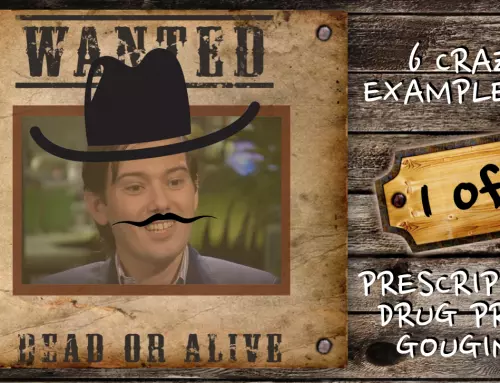
Merrill Goozner is one of our heroes. In fact, his 2004 book, The $800 Million Pill, was one of our inspirations for starting eDrugSearch.com. Obviously, ours is a for-profit venture — but we also think we are doing some good by offering consumers an alternative to Big Pharma’s rigged pricing system in the U.S.
We recently asked Merrill about his interest in the pharmaceutical industry, his opinion on Canadian imports, and his predictions for the future of our healthcare system.
Cary: You’ve covered many, many stories over the course of your career in journalism. What is it about the pharmaceutical industry that has captured and held your interest?
Merrill: While attending the Breaux-Thomas commission hearings on Medicare reform on Capitol Hill in the late 1990s, I heard pharmaceutical industry executives say that unless they got high prices, innovation would dry up. Over three decades as a business reporter, I had always heard executives say that unless they invested in R&D to develop new products and processes, they would die. Here was a set of companies saying unless you gave them money to invest in R&D, you would die. Cognitive dissonance, to say the least. This led me to begin investigating what lay behind industry’s claims. And I guess I’ve yet to lose interest in the drug industry in particular and health care in general.
Cary: In The $800 Million Pill, you describe how much of the money attributed to drug R&D actually goes to advertising and copycat drugs. Does this mean the argument that high drug prices are necessary for research is simply a red herring — or is the issue more complex than that?
Merrill: If half of industry R&D is spent on developing drugs that add little or nothing to physicians’ ability to fight disease, and a substantial portion of industry marketing costs go to promote these drugs, or to whatever extent this is true, then the cost of drugs could be reduced by that amount without any harm to public health. Indeed, I would argue that eliminating these wasteful expenditures would free up industry resources to pour into more speculative (difficult) R&D projects, or those that have smaller markets (rare diseases). In the end, this would do a lot more to foster innovation than the current blockbuster model, which inevitably looks at reproducing what’s already on the market as patents expire.
Cary: Do you believe the FDA’s stated concern about the safety of Canadian drugs is legitimate — or is the agency merely using Big Pharma talking points to scare consumers from choosing the lower-cost option?
Merrill: I’m not a big fan of importing drugs from Canada simply because it is an excuse not to deal with our own dysfunctional health care system here at home. That said, I always find it curious that free traders are worried about the safety of drugs imported from Canada, but not lettuce from Mexico. I suspect Canada’s system for protecting its consumers against unsafe drugs is far superior to Mexico’s system for protecting consumers against contaminated food.
Cary: What is your view on the importation of drugs from Canada? Should it be legal — and if so, why isn’t it legal?
Merrill: Given what I said above, of course it should be legal. I’m for free trade.
Cary: You’ve pointed out in some of your writings that Canadian imports are more or less a Band-Aid for much bigger problems — namely, our broken healthcare system and, specifically, the unhealthy influence of Big Pharma on government policy. What reforms do you hope to see in our healthcare system over the next five years — and what reforms do you actually expect to see?
Merrill: I think the big issue is universal health care coverage, and I believe we will do something about it. But I suspect it will be along the lines of what was done for the Medicare drug benefit, which means taxpayers will pay through the nose to avoid taking on the special interests in the provider community: drug, device and durable equipment manufacturers, the hospitals, the physician guilds and a research establishment that earns lots of money pursuing product-oriented intervention strategies instead of the low-tech public health approaches that would have a far greater return on improving the health of the American people at lower cost.

![[Video] Pharma “Bad Boy” Martin Shkreli Refused to Testify to Congress](/wp-content/uploads/2016/02/Pharma-22Bad-Boy22-Martin-Martin-Shkreli-500x383.png)










[…] Over at eDrugSearch is a brief and excellent interview with Merrill Goozner, journalist and author of the great book, the $800 Million Pill. There are so many quotable quotes in the interview that I’m tempted to steal them all. Instead, I’ll leave you with just one teaser: Goozner: If half of industry R&D is spent on developing drugs that add little or nothing to physicians’ ability to fight disease, and a substantial portion of industry marketing costs go to promote these drugs, or to whatever extent this is true, then the cost of drugs could be reduced by that amount without any harm to public health. Indeed, I would argue that eliminating these wasteful expenditures would free up industry resources to pour into more speculative (difficult) R&D projects… […]
[…] As for the FDA’s agenda? We’re reminded of what Merrill Goozner told us in our recent chat with him: I always find it curious that free traders are worried about the safety of drugs imported from Canada, but not lettuce from Mexico. I suspect Canada’s system for protecting its consumers against unsafe drugs is far superior to Mexico’s system for protecting consumers against contaminated food. […]